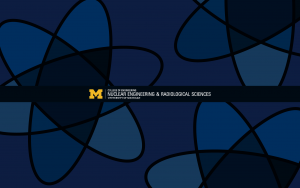Presented By: Nuclear Engineering & Radiological Sciences
NERS Colloquia: Structural Materials Degradation in Molten Salt Reactor Environments
Adrien Couet, Assistant Professor, University of Wisconsin-Madison

Abstract
The liquid fueled MSR is among the advanced reactor concepts being considered for development by the U.S. Department of Energy. Key attributes of this reactor concept include: (i) high degree of passive safety, (ii) atmospheric pressure operation, (iii) high thermal efficiency due to high volumetric heat capacity and thermal conductivity of liquid salts, (iv) lower spent fuel per unit of energy, (v) high solubility of most fission products in liquid salts and (vi) absence of fuel assemblies. Materials selection for liquid fueled MSRs is based on ASME Sec III Div 5 and thus present unique challenges because of the high Cr content of current qualified alloys. Consequently, and considering the short-term deployment of MSRs, it is necessary to independently improve corrosion resistance of current code codified alloys by surface treatments. On the other hand, if one considers long-term deployment of MSRs, novel code certified alloys would need to be developed. Indeed, although Hastelloy-N, a low Cr, high Mo alloy developed during the MSRE program, has shown remarkable corrosion resistance in molten fluoride salts, this alloy has limited creep-rupture strength, irradiation damage resistance and has shown corrosion induced embrittlement. Consequently, this study focuses on the down-selection of a series of cladded 316H stainless steels (SS) and novel alloys based on corrosion resistance in molten FLiNaK at 700°C for up to 1000 hours. Finally, specific separate effects experiments are conducted to assess the influence of the experimental conditions on corrosion and mass transport.
Bio
Dr. Adrien Couet is an Assistant Professor in the Department of Nuclear Engineering and Engineering Physics at the University of Wisconsin-Madison, where he manages the MAterials Degradation under COrrosion and Radiation (MADCOR) laboratory. Previously, he worked as a nuclear materials research engineer at EDF (Electricité de France) in France, focusing on high-temperature aqueous corrosion and modeling corrosion of nuclear materials. He got hired at EDF after graduating in 2014 with a PhD in Nuclear and Mechnical Engineering from Penn State University. Over the last five years, Dr. Couet has worked on developing his research group around fundamental understanding of materials degradation and alloy design for extreme environments. MADCOR research programs evolves around fuel cladding corrosion in LWRs, developing structural materials and cladding for molten salt reactors and designing novel radiation resistant compositionally complex alloys. Dr. Couet also co-manages the UW Ion Beam Laboratory and is a co-organizer of the Nuclear Innovation Bootcamp, which aims at training future entrepreneurs in the nuclear field.
The liquid fueled MSR is among the advanced reactor concepts being considered for development by the U.S. Department of Energy. Key attributes of this reactor concept include: (i) high degree of passive safety, (ii) atmospheric pressure operation, (iii) high thermal efficiency due to high volumetric heat capacity and thermal conductivity of liquid salts, (iv) lower spent fuel per unit of energy, (v) high solubility of most fission products in liquid salts and (vi) absence of fuel assemblies. Materials selection for liquid fueled MSRs is based on ASME Sec III Div 5 and thus present unique challenges because of the high Cr content of current qualified alloys. Consequently, and considering the short-term deployment of MSRs, it is necessary to independently improve corrosion resistance of current code codified alloys by surface treatments. On the other hand, if one considers long-term deployment of MSRs, novel code certified alloys would need to be developed. Indeed, although Hastelloy-N, a low Cr, high Mo alloy developed during the MSRE program, has shown remarkable corrosion resistance in molten fluoride salts, this alloy has limited creep-rupture strength, irradiation damage resistance and has shown corrosion induced embrittlement. Consequently, this study focuses on the down-selection of a series of cladded 316H stainless steels (SS) and novel alloys based on corrosion resistance in molten FLiNaK at 700°C for up to 1000 hours. Finally, specific separate effects experiments are conducted to assess the influence of the experimental conditions on corrosion and mass transport.
Bio
Dr. Adrien Couet is an Assistant Professor in the Department of Nuclear Engineering and Engineering Physics at the University of Wisconsin-Madison, where he manages the MAterials Degradation under COrrosion and Radiation (MADCOR) laboratory. Previously, he worked as a nuclear materials research engineer at EDF (Electricité de France) in France, focusing on high-temperature aqueous corrosion and modeling corrosion of nuclear materials. He got hired at EDF after graduating in 2014 with a PhD in Nuclear and Mechnical Engineering from Penn State University. Over the last five years, Dr. Couet has worked on developing his research group around fundamental understanding of materials degradation and alloy design for extreme environments. MADCOR research programs evolves around fuel cladding corrosion in LWRs, developing structural materials and cladding for molten salt reactors and designing novel radiation resistant compositionally complex alloys. Dr. Couet also co-manages the UW Ion Beam Laboratory and is a co-organizer of the Nuclear Innovation Bootcamp, which aims at training future entrepreneurs in the nuclear field.